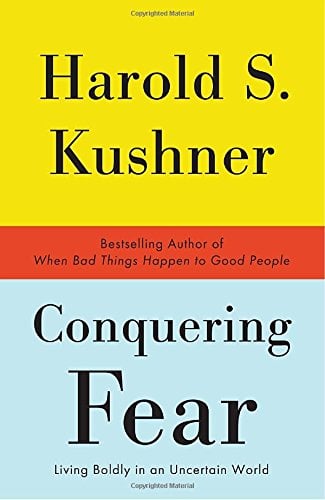Conquering Fear: Living Boldly in an Uncertain World / Harold S. Kushner
| List Price: | |
Our Price: $12.00 | |
|
For Bulk orders
| |
|
Used Book Price: $1.99 | |
| Conquering Fear: Living Boldly in an Uncertain World / Harold S. Kushner | |
| Publisher: Anchor | |
| Availability:Usually ships in 24 hours | |
| Sales Rank: 421236 | |
|
Number of Pages 192
Type Paperback
A Q&A with Harold S. Kushner
 Question: You have written about so many of the issues that every one of us will confront at some point in life--loss, grief, disappointment. When and why did you decide to write a book about fear?
Question: You have written about so many of the issues that every one of us will confront at some point in life--loss, grief, disappointment. When and why did you decide to write a book about fear?
Harold S. Kushner: For some time, I’ve been meeting people who are less happy than they have a right to be because they are afraid--afraid of losing their job, afraid that something will happen to someone in their family, afraid of another terrorist attack. You can’t enjoy life when you feel that way. Now, I can’t guarantee that none of those things will happen, but I think I can show people how to live with those concerns but not let them drain the joy from their lives.
Question: You began working on this book before the events of this past year and the collapse of the economy. Certainly these are times in which people are more fearful than ever and face new challenges in their daily lives. Do you think the nature of our fears has changed, or that these times just magnify the fears we already had?
Harold S. Kushner: More than anything else, we’ve always worried about something terrible happening to us or to our world. What has changed is, with improved communication and 24-hour news channels, we hear about more of such things happening somewhere, not necessarily anywhere close to us, and we worry. As one doctor put it, "anthrax is not contagious, but fear of anthrax is." And of course with what has been happening with the economy, we have more things to worry about. People are worried about losing their jobs, losing their homes, losing their retirement savings. I worry that there is a tipping point beyond which we find ourselves worried about so many things that it virtually changes our personality. We become fearful, timid, helpless people, afraid of trying anything or doing anything at all.
Question: Your book is titled Conquering Fear--not accepting fear or overcoming fear or coping with fear. Why did you choose that very powerful word for your title?
Harold S. Kushner: If it were easy to lower our level of apprehension, we would all do it. But I don’t think it should be our goal to eliminate fear. There are things we should be afraid of--crime, dangers to our health, people looking to cheat us. It would be foolhardy to go through life so confident that nothing bad will ever happen to us because we’re good people. But there is a crucial difference between concern which is good and fear which can be debilitating. We don’t want to let our lives be defined by the things we’re afraid of. I remember the Israeli man whose daughter was badly burned in a terrorist incident, saying "there are worse things in life than dying, and one of them is to live every minute of your life in fear." Our goal should be to make fear our servant rather than our master.
Question: You write, "I resolve not to let my fears of what might happen prevent me from anticipating with pleasure what I hope will happen." How are fear and hope linked?
Harold S. Kushner: Both are ways of anticipating a future that hasn’t happened yet. One of them, fear, anticipates the worst happening; the other, hope, looks forward to something better. It seems to me that anticipating the worst is likely to paralyze and discourage us, leaving us feeling helpless, while envisioning the more favorable outcome may give us the psychological energy to do the things we have to do to bring it about.
Question: We know what fear does to us emotionally, but what does fear do to us physically?
Harold S. Kushner: What affects us emotionally will inevitably have physical consequences. Stress makes us tense. We don’t sleep as well, we feel tired and we are tempted to overeat. We focus more on ourselves and distance ourselves from other people. We are prone to misunderstand other people’s words and actions.
Question: What made you decide to devote a chapter to fear of rapid change?
Harold S. Kushner: As a man in late middle age, I feel the effect of having been left behind by the rate of change in society every time I have to ask my grandson to program my cell phone or straighten out my computer. I’m not embarrassed to ask for help, but I would be more comfortable in a world where knowledge flowed from older people to younger ones rather than the other way around. I’m also concerned that the sense of disorientation so many people feel at the unprecedented rate of change is feeding into the rise of intolerance and religious fundamentalism and resistance to necessary changes in religion and society.
A Q&A with Harold S. Kushner Question: You have written about so many of the issues that every one of us will confront at some point in life--loss, grief, disappointment. When and why did you decide to write a book about fear?
Question: You have written about so many of the issues that every one of us will confront at some point in life--loss, grief, disappointment. When and why did you decide to write a book about fear?
Harold S. Kushner: For some time, I ve been meeting people who are less happy than they have a right to be because they are afraid--afraid of losing their job, afraid that something will happen to someone in their family, afraid of another terrorist attack. You can t enjoy life when you feel that way. Now, I can t guarantee that none of those things will happen, but I think I can show people how to live with those concerns but not let them drain the joy from their lives.
Question: You began working on this book before the events of this past year and the collapse of the economy. Certainly these are times in which people are more fearful than ever and face new challenges in their daily lives. Do you think the nature of our fears has changed, or that these times just magnify the fears we already had?
Harold S. Kushner: More than anything else, we ve always worried about something terrible happening to us or to our world. What has changed is, with improved communication and 24-hour news channels, we hear about more of such things happening somewhere, not necessarily anywhere close to us, and we worry. As one doctor put it, "anthrax is not contagious, but fear of anthrax is." And of course with what has been happening with the economy, we have more things to worry about. People are worried about losing their jobs, losing their homes, losing their retirement savings. I worry that there is a tipping point beyond which we find ourselves worried about so many things that it virtually changes our personality. We become fearful, timid, helpless people, afraid of trying anything or doing anything at all.
Question: Your book is titled Conquering Fear--not accepting fear or overcoming fear or coping with fear. Why did you choose that very powerful word for your title?
Harold S. Kushner: If it were easy to lower our level of apprehension, we would all do it. But I don t think it should be our goal to eliminate fear. There are things we should be afraid of--crime, dangers to our health, people looking to cheat us. It would be foolhardy to go through life so confident that nothing bad will ever happen to us because we re good people. But there is a crucial difference between concern which is good and fear which can be debilitating. We don t want to let our lives be defined by the things we re afraid of. I remember the Israeli man whose daughter was badly burned in a terrorist incident, saying "there are worse things in life than dying, and one of them is to live every minute of your life in fear." Our goal should be to make fear our servant rather than our master.
Question: You write, "I resolve not to let my fears of what might happen prevent me from anticipating with pleasure what I hope will happen." How are fear and hope linked?
Harold S. Kushner: Both are ways of anticipating a future that hasn t happened yet. One of them, fear, anticipates the worst happening; the other, hope, looks forward to something better. It seems to me that anticipating the worst is likely to paralyze and discourage us, leaving us feeling helpless, while envisioning the more favorable outcome may give us the psychological energy to do the things we have to do to bring it about.
Question: We know what fear does to us emotionally, but what does fear do to us physically?
Harold S. Kushner: What affects us emotionally will inevitably have physical consequences. Stress makes us tense. We don t sleep as well, we feel tired and we are tempted to overeat. We focus more on ourselves and distance ourselves from other people. We are prone to misunderstand other people s words and actions.
Question: What made you decide to devote a chapter to fear of rapid change?
Harold S. Kushner: As a man in late middle age, I feel the effect of having been left behind by the rate of change in society every time I have to ask my grandson to program my cell phone or straighten out my computer. I m not embarrassed to ask for help, but I would be more comfortable in a world where knowledge flowed from older people to younger ones rather than the other way around. I m also concerned that the sense of disorientation so many people feel at the unprecedented rate of change is feeding into the rise of intolerance and religious fundamentalism and resistance to necessary changes in religion and society.
Now you can buy Books online in USA,UK, India and more than 100 countries.
*Terms and Conditions apply
Disclaimer: All product data on this page belongs to
 .
.No guarantees are made as to accuracy of prices and information.










